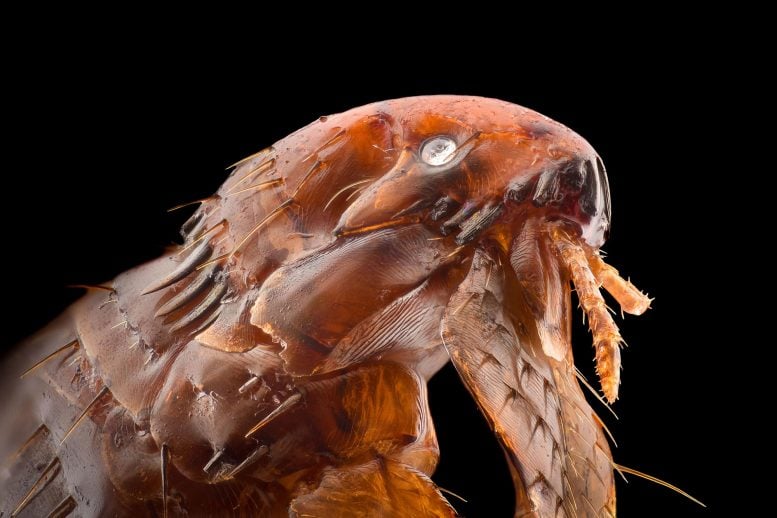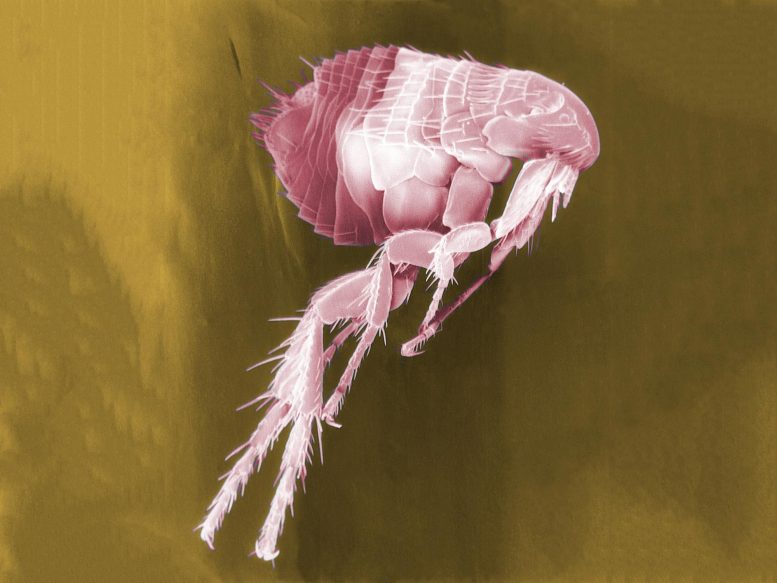
A study of more than 1,400 protein-coding genes of fleas has resolved one of the longest standing mysteries in the evolution of insects, reordering their placement in the tree of life and pinpointing who their closest relatives are.
The University of Bristol study, published in the journal Palaeoentomology, drew on the largest insect molecular dataset available. The dataset was analyzed using new statistical methods, including more sophisticated algorithms, to test all historically proposed hypotheses about the placement of fleas on the insect tree of life and search for new potential relationships.
The findings overturn previously held theories about fleas, the unusual anatomy of which has meant that they eluded classification in evolutionary terms. According to the authors of the study, contrary to popular belief, fleas are technically scorpionflies, which evolved when they started feeding on the blood of vertebrates sometime between the Permian and Jurassic, between 290 and 165 million years ago.
The closest living relatives of fleas are the members of the scorpionfly family Nannochoristidae, a rare group with only seven species native to the southern hemisphere. Unlike the blood-thirsty fleas, adult nannochoristid scorpionflies lead a peaceful existence feeding on nectar.
“Of all the parasites in the animal kingdom, fleas hold a pre-eminent position. The Black Death, caused by a flea-transmitted bacterium, was the deadliest pandemic in the recorded history of mankind; it claimed the lives of possibly up to 200 million people in the 14th century,” says lead author and undergraduate student Erik Tihelka from the School of Earth Sciences.

“Yet despite their medical significance, the placement of fleas on the tree of life represents one of the most persistent enigmas in the evolution of insects.”
It used to be thought that all blood-feeding parasitic insects began life as either predators or by living alongside vertebrate hosts in their nests. In actual fact, blood feeding can evolve in groups that originally fed on nectar and other plant secretions.
“It seems that the elongate mouthparts that are specialized for nectar feeding from flowers can become co-opted during the course evolution to enable sucking blood,” says Mattia Giacomelli, a PhD student at the University of Bristol who participated in the study.
Previous studies had suggested a connection between fleas and anatomically unusual groups of scorpionflies, but their exact relationships remained unresolved. The mystery was prolonged by the fact that flea genomes underwent rapid evolution, which makes reconstructing ancient evolutionary relationships challenging. Moreover, the nannochoristids are a quite rare and little-studied group that only occurs in New Zealand, southeastern Australia, Tasmania, and Chile, so they are easy to overlook.
“The new results suggest that we may need to revise our entomology textbooks. Fleas no longer deserve the status of a separate insect order, but should actually be classified within the scorpionflies,” says Chenyang Cai, associate professor at the Nanjing Institute of Geology and Palaeontology (NIGP) and a research fellow at the University of Bristol specializing on Mesozoic insects.
“We have exceptionally preserved fossil fleas from the Jurassic and Cretaceous. In particular, some Jurassic fleas from China, about 165 million years old, are truly giant and measure up to two centimeters. They may have fed on dinosaurs, but that is exceedingly difficult to tell. What is more interesting is that these ancient fleas share important characters with modern scorpionflies.”
Reference: “Fleas are parasitic scorpionflies” by Erik Tihelka, Mattia Giacomelli, Di-Ying Huang, Davide Pisani, Philip C. J. Donoghue and Chen-Yang Cai, December 2020, Palaeoentomology.
DOI: 10.11646/palaeoentomology.3.6.16
5 Comments
A flea is still a flea and has not been anything else there is no proof of evolution of one to another species either animal or plant get the facts straight before putting these things online
Why are you on a science site if facts mean nothing to you?
If God gave you a wonderful brain – chances are he intended for you to use it to it’s full potential. Religion has been at the forefront of scientific research for millennia, some dogmatic individuals and groups have caused some deviation from that core truth. The “Big Bang”, is the name given to a theory from a Belgian “man of the cloth” and man of science- Georges Lemaître – who first proposed the “primeval atom”, from which the clock of evolution has been ticking ever since it was switched on.
When I was being brought up in the Catholic Church, there were many parables that struck me and had a profound influence on my life or they sat in my mind passing judgment on my choices. One particular one, which is really starting to exert pressure as I clock up the years, is the one about the talents. The basic story is don’t hide away any treasure such as talent, ability or capital etc that can be used to create more treasure such as…lest one becomes guilty of wasting God’s gifts- given by God, to creations in his own image, to fill the world with more of his gifts. Basically, if you use God’s gifts to further his creation and apparently we do this every time we do something out of love, then you will gain entry to the Kingdom of Heaven, according to the parable that is.
So, in conclusion, use your God given brain to further his creation by uncovering the knowledge which he has provided for us to employ. Otherwise, you are hiding away his gift to you and you are wasting it because you are afraid of losing it.
Apparently, Peter & fleas have a shared evolutionary trait: small-mindedness!
In a documentary about Pope Francis, the German producer asked the Pope about the conflicts between creationism & science & Francis got very dismissive & said that there was NO conflict but rather harmony (I’m paraphrasing). He said the parables of the Bible (Noah’s Ark, Adam/Eve) were about moral messaging & NOT LITERAL events at a time when story telling was the only means of communication for the illiterate masses. He flatly rejected those who use Christianity as a veil for their anti-science agenda
Sirs:
You begin online articles with a bold headline, followed by the identical phrase at the beginning of the article. This is very irksome. You might wish to cause a pleasant feeling rather than a negative one at the outset of one’s reading.